The Nigeria Security and Civil Defence Corps, commonly known as NSCDC, works hard every day to ensure the safety of citizens and critical infrastructure around the country. As a paramilitary agency focused on civil security, the NSCDC plays an important role in maintaining law and order.
Introduced in 1967, the NSCDC started as a small volunteer group to sensitize Nigerians on civil Defence and provide intelligence to the police during the Nigerian Civil War. Over the years, the organization has evolved into a fully-fledged security agency focused on averting and mitigating disasters as well as protecting lives and property. With thousands of officers stationed in all 36 states and the Federal Capital Territory, Abuja, the NSCDC has become an integral part of Nigeria’s security architecture.
In this article, we’ll explore the history, mandate, structure, and activities of the Nigeria Security and Civil Defence Corps in more detail. Stay with us to learn all about this vital organization on the frontlines of Nigeria’s security.
What Is the Nigeria Security and Civil Defence Corps (NSCDC)?
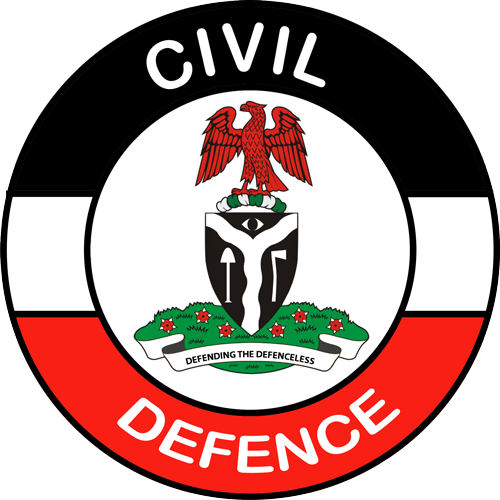
The Nigeria Security and Civil Defence Corps (NSCDC) is a paramilitary agency in Nigeria that is saddled with the responsibility of maintaining peace and order, protecting lives and property, and enforcing regulations.
In a nutshell, the NSCDC prevents and detects crimes, apprehends offenders, protects critical government infrastructure like pipelines, and responds to emergency situations. They also help in disaster management, give early warnings to vulnerable communities, and collaborate with similar organizations.
Through cooperation with communities, the NSCDC has helped curb vandalism, oil bunkering, and other crimes in Nigeria. They work to ensure safety so that people can go about their daily lives without fear. Overall, the NSCDC strives for a lawful, orderly, and just society.
Nigeria Security and Civil Defence Corps (NSCDC)
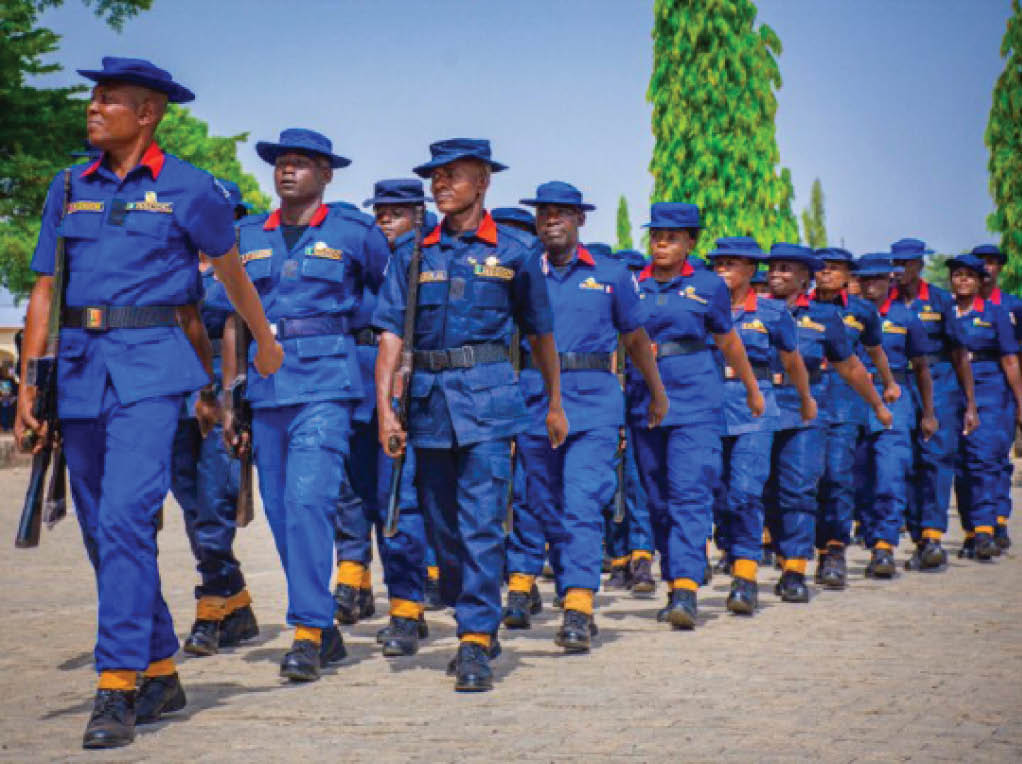
To understand the NSCDC, you first need to know why it was formed. In 1967, Nigeria had its civil war, which caused a rise in civil unrest and crime. The government saw a need for an organization to handle issues around civil Defence, so in 1970, the NSCDC was established.
With over 100,000 personnel across Nigeria, the NSCDC has Public Relations Officers in all states to promote dialogue and cooperation with people. They aim to foster a safe environment for citizens to live and work.
Though still a developing organization, the NSCDC plays an important role in homeland security. By understanding their purpose and operations, you can better support them in making Nigeria a safer place.
History and Formation of the Nigeria Security and Civil Defence Corps
The Nigeria Security and Civil Defence Corps (NSCDC) was introduced in May 1967 during the Nigerian Civil War to support the police and military in maintaining peace and security.
The NSCDC was first known as the Lagos Civil Defence Committee. It was set up to protect civilians during the civil war. In 1970, it became the Lagos Civil Defence Organization with a mandate to protect government critical infrastructure from sabotage.
In 1984, the corps was transformed into a National Security Outfit. The organization was renamed the Nigeria Security and Civil Defence Corps. In 1988, the Corps was significantly restructured, resulting in the construction of Commands around the Federation, including Abuja, and the addition of unique functions by the Federal Government. Its role expanded to include:
- Protecting government infrastructure
- Assisting in disaster management
- Controlling civil disorders
- Protecting strategic government installations
On June 28, 2003, Chief Olusegun Obasanjo, GCFR, the former president and Commander in Chief of the Armed Forces of the Federal Republic of Nigeria, signed into law an Act to grant legislative backing to the NSCDC enacted by the National Assembly.
The NSCDC is statutorily empowered by Lay Act No. 2 of 2003, which officially established the organization as an armed paramilitary agency of the Federal Government of Nigeria.
The NSCDC has grown into a formidable national security outfit. It strives to achieve a safe, secure and peaceful environment for socio-economic activities to thrive in Nigeria. The act was amended by Act 6 of 4th June 2007 to enhance the statutory duties of the corp.
Who is the Head of the Nigeria Security and Civil Defence Corps (NSCDC)?
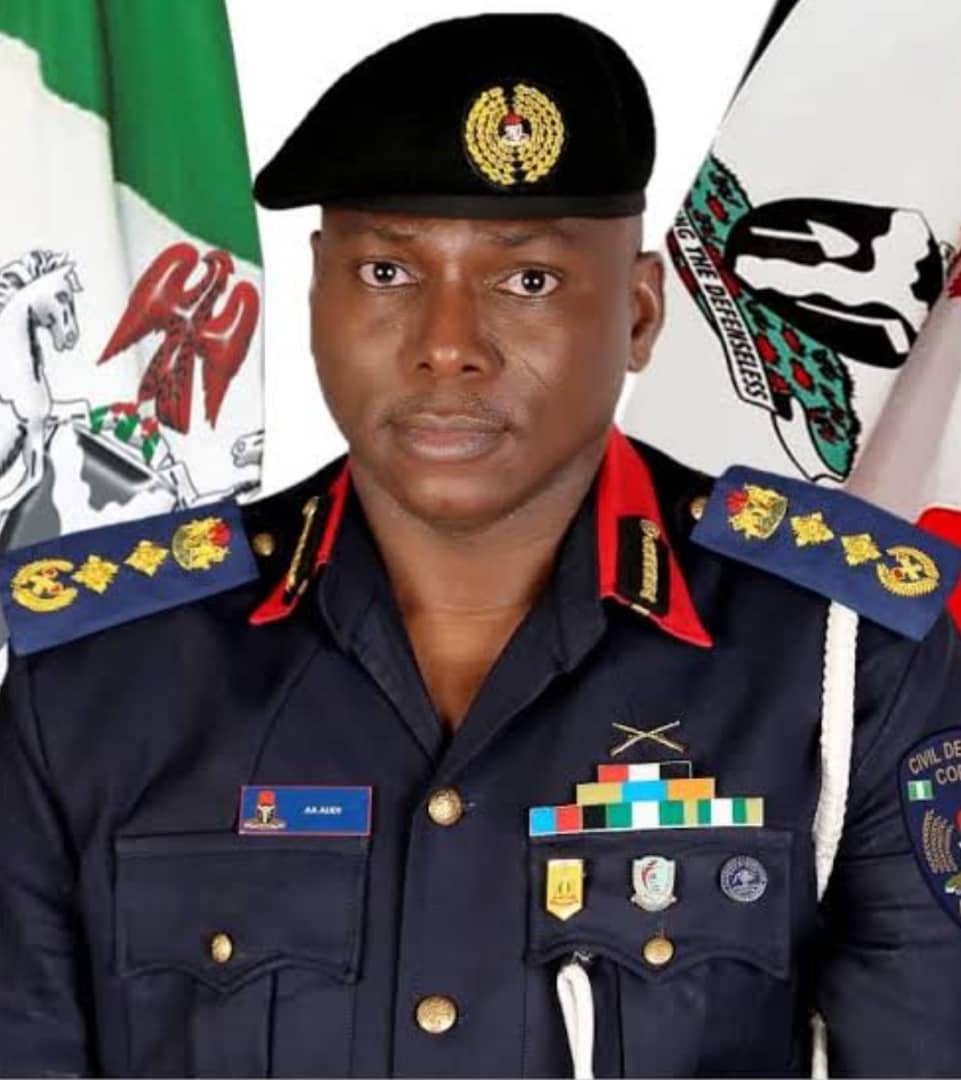
The head of the Nigeria Security and Civil Defence Corps (NSCDC) is known as the Commandant General. The title has existed since 2004. The position is held by a General, who is assisted by Commandants, Deputy Commandant generals, and Assistant Commandant Generals.
The current Commandant General of NSCDC is Ahmed Abubakar Audi. Former President Muhammadu Buhari approved his appointment in February 2021, replacing Abdullahi Gana Muhammadu.
Responsibilities
The Commandant General oversees the administration and operation of the NSCDC. His duties include:
- Providing leadership and direction to the NSCDC.
- Implementing policies, programs and projects approved by the NSCDC Board.
- Ensuring the NSCDC achieves its mission and objectives.
- Maintaining high standards of professionalism, discipline, and welfare of NSCDC staff.
- Liaising with relevant government agencies and stakeholders on civil Defence matters.
- Performing any other duties as may be required by the NSCDC Board.
The Commandant General is supported in his role by 8 Assistant Commandant Generals (ACGs) and 45 Commandants, who head various directorates in the NSCDC like operations, administration, intelligence, and anti-vandal unit, among others.
List of Commandants-General
- Abiola Aturamu (2004-2005)
- Adewale John Abolurin (2005-2015)
- Abdullahi Gana Mahammadu (2015-February 2021)
- Ahmed Abubakar Audi (since February 2021)
The NSCDC hierarchy is structured along military lines from the Commandant General at the top to Corps Assistants at the base.
Organizational structures in the Nigeria Security and Civil Defence Corps (NSCDC)
The Nigeria Security and Civil Defence Corps (NSCDC) has a well-structured organizational hierarchy for effective administration and operation.
- Commandant General’s Office
Directorates
The NSCDC has six directorates, which are:
- Directorate of Administration
- Directorate of Disaster Management
- Directorate of Intelligence and Investigation
- Directorate of Operations
- Directorate of Technical Service
- Directorate of Critical Infrastructure and National Assets
Each directorate is headed by an Assistant Commandant General.
Institutions
- Civil Defence Academy, Sauka
- College of Peace and Disaster Management, Katsina
- College of Security Management, Ogun State
Nigeria Security and Civil Defence Corps (NSCDC) Organizational Ranks
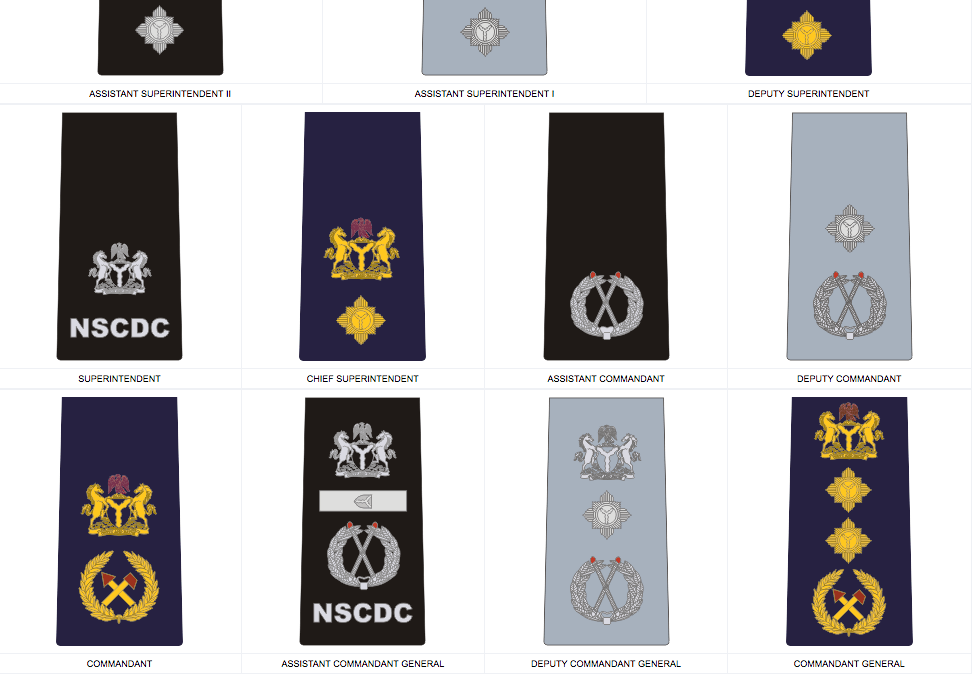
The NSCDC has well-defined ranks within its organizational structure. The ranks in ascending order are:
- Corps Assistant III
- Corps Assistant II
- Corps Assistant I
- Assistant Inspector
- Inspector
- Senior Inspector
- Principal Inspector
- Assistant Chief Inspector
- Deputy Chief Inspector
- Chief Inspector
- Assistant Superintendent II
- Assistant Superintendent
- Deputy Superintendent
- Superintendent
- Chief Superintendent
- Senior Superintendent
- Chief Superintendent
- Assistant Commandant
- Deputy Commandant
- Commandant
- Assistant Commandant General
- Deputy Commandant General
- Commandant General
The NSCDC ranks follow a hierarchical structure with clear lines of authority and responsibility at each level. The ranks denote increasing levels of responsibility, from Corps Assistant up to the Commandant General.
Main Responsibilities and Duties of the NSCDC
The NSCDC has many crucial responsibilities to carry out. Here are the main duties of the Corps:
- Protecting critical national assets and infrastructure. The NSCDC secures important locations like oil pipelines, airports, seaports, etc.
- Crowd control and management. The Corps helps maintain public order at events, rallies and emergency situations.
- Traffic control. NSCDC officers direct traffic and enforce road safety rules.
- Private guard licensing and regulation. The Corps screens, trains and licenses private security companies and guards.
- Fire prevention and safety. The NSCDC conducts fire drills, inspects buildings for fire hazards and responds to fire emergencies.
- Disaster management. The Corps assists in rescue and relief operations during disasters like floods, oil spills, building collapses, etc.
- Conflict resolution. The NSCDC mediates in communal, tribal and land disputes to promote peace.
- Fighting crime. The Corps collaborates with the police to curb criminal activities like oil bunkering, drug trafficking, human trafficking, etc.
The goal of the NSCDC is to maintain peace and order, protect lives and property, and prevent criminal behaviour. They work to achieve this through surveillance, intelligence gathering, and collaboration with communities. The NSCDC also handles disaster management and tackles issues like oil bunkering, terrorism, and kidnapping.
How Much Do NSCDC Officers Earn?
The salaries and allowances of NSCDC officers are determined by the Consolidated Paramilitary Salary Structure (CONPASS) used by all paramilitary agencies in Nigeria. As a paramilitary organization, the NSCDC employs a rank structure similar to the military and police. Ranks range from the lowest as Assistant Corps I to the highest as Commandant General.
Salaries increase with each promotion to a higher rank. An Assistant Corps I, the lowest rank, earns around N50,000 per month. A Corps Assistant, the next rank up, earns N70,000. Level 4 Inspectorate Cadre earns N80,000 to N100,000 per month this is with allowances and bonuses. Higher ranks like Chief Superintendent and Commandant earn N250,000 to N700,000 per month. The Commandant General, the highest rank, earns over N1.5 million N2 million per month, including allowances.
In addition to basic salary, NSCDC officers receive allowances for responsibilities like accommodation, transportation, and feeding. They are also entitled to benefits such as healthcare, insurance, annual leave, and retirement benefits like pension. Some officers may receive additional allowances for hazard pay if posted to a high-risk area.
The salary and benefits of NSCDC officers are quite competitive compared to similar paramilitary organizations in Nigeria. While salaries at the lower ranks could be higher, the NSCDC provides good career progression and opportunities to advance to higher ranks with better pay over time through training, experience, and performance.
Training and Recruitment in the NSCDC
The NSCDC conducts training and recruitment to maintain high standards. Recruits go through a multi-phase training program at the NSCDC training schools across Nigeria.
Training
The duration of NSCDC training is determined by the qualification you are training with. Those in training to become commissioned officers may spend up to 12 months before being commissioned into the service. Those who enlisted utilizing SSCE, NCE, or ND usually train for up to 6 months before becoming official members of the NSCDC.
New recruits first complete six months of basic training to learn discipline, physical fitness, shooting, investigation procedures and civil Defence duties. After graduating, officers undergo further on-the-job training and mentoring.
The NSCDC also provides continuous education and skills upgrading for existing personnel. Refresher courses, seminars and workshops keep officers up-to-date with new laws, Defence tactics, and technologies. Promotion exams evaluate officers’ knowledge and competency.
Recruitment
To join the NSCDC, applicants must be Nigerian citizens between 18 to 35 years old, have at least a Senior Secondary School Certificate, and pass medical and aptitude tests. Background checks review applicants’ character, fitness, and police records.
Other requirements include:
- Male applicants must be at least 1.65m tall, while female applicants are expected to be at least 1.60m tall.
- Male applicants are expected to have a minimum chest measurement of 0.87m.
- You must be a Nigerian by birth with a means of identification to prove this
- Computer Literacy and English proficiency
Shortlisted candidates are invited for screening and interviews at NSCDC state commands. Successful applicants then commence training at NSCDC training schools. The recruitment process aims to enlist capable and upstanding individuals dedicated to serving the nation.
How to Apply for Nigeria Civil Defence Recruitment
To apply for the Nigeria Civil Defence recruitment, follow these steps:
- Visit the Nigeria Civil Defence Corps official website and check for ongoing recruitment openings. The openings are usually advertised on the website.
- Ensure you meet the minimum requirements for the role you’re applying for. The requirements include things like age, educational qualifications, and physical fitness.
- Fill out the application form online or purchase. Provide accurate details and ensure all required documents are attached.
- Submit your completed application before the deadline. Late applications will not be accepted.
- Attend the screening exercise, which may include aptitude tests, medical tests, and physical fitness tests. Only shortlisted candidates will be invited for screening.
- If successful after the screening, you will receive an invitation for further training at the NSCDC training college. The training usually lasts for a few months.
- After passing out from the training college, you will be deployed to your duty post to commence your career as an NSCDC officer.
- The starting salary for NSCDC officers varies based on qualifications and role. Promotions and salary increments depend on performance and duration of service.
The NSCDC recruitment process aims to enlist capable men and women to help achieve the corps mandate of protecting lives and property in Nigeria. If you have a passion for service and meet the requirements, apply for a rewarding career keeping Nigeria safe.
Challenges Facing the NSCDC and Areas for Improvement
The NSCDC faces several significant challenges in fulfilling its mandate. Here are some of the major areas needing improvement:
Lack of Funding
The NSCDC lacks adequate funding to properly equip its personnel and improve infrastructure. More funding is needed to provide necessary tools, weapons, vehicles and training for officers.
Inadequate Staffing
The NSCDC has too few personnel to effectively cover the entire country. More recruitment and training of new officers is required to strengthen security nationwide.
Corruption
There are reports of bribery and corruption within the NSCDC, damaging the agency’s credibility and effectiveness. Stronger oversight and accountability measures must be put in place to curb corrupt practices.
Lack of Training
Many NSCDC officers lack the proper training and skills required for their roles. Additional training programs are needed to ensure officers have the necessary knowledge and expertise to serve competently.
Overlapping Mandates
The NSCDC’s mandate overlaps with other security agencies like the police, causing confusion and power struggles. Roles and responsibilities need to be better defined to maximize efficiency.
Political Interference
The NSCDC faces interference from political actors seeking to influence its operations for their own gains. It needs more independence and autonomy to function impartially.
Poor Working Conditions
Low pay, lack of insurance and hazardous working environments negatively impact officer morale and performance. Improved benefits, salaries and safer operational conditions would boost motivation and productivity.
Limited Public Trust
Some members of the public distrust the NSCDC due to reports of human rights abuses and excessive use of force. Reforms to complaint mechanisms and disciplinary procedures could help build greater public confidence in the agency.
Conclusion
So there you have it, an overview of the NSCDC and its role in maintaining peace and security in Nigeria. As you’ve learned, the Corps has come a long way since its inception and now has a presence in all 36 states. While there is still more work to be done, the NSCDC is making progress in fighting crimes like oil bunkering, vandalism, and terrorism that threaten Nigeria’s growth and stability.
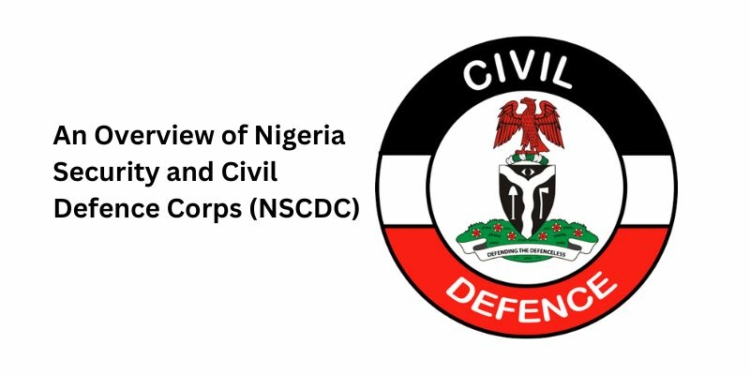
Discussion about this post